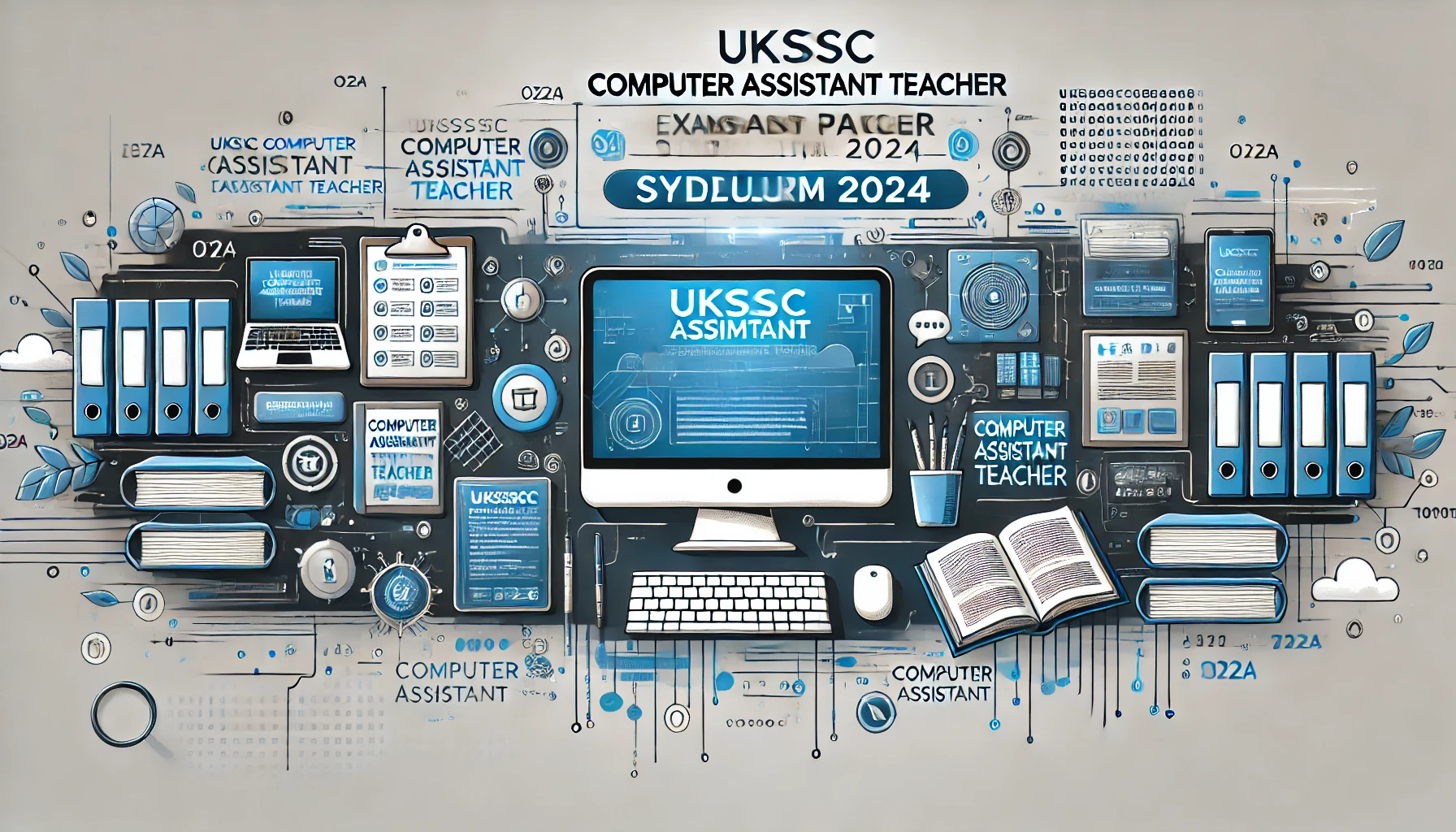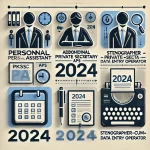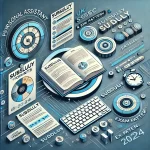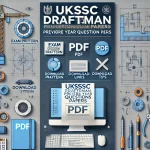The Uttarakhand Service Selection Commission (UKSSSC) will going to conduct written examination on 15 posts of computer assistant primary teacher and 12 posts assistant teacher (LT) for the same subject. The exam will be schedule to be conducted in the upcoming year that is in Feb 2025. Eligible applicants who have applied for this direct computer teaching recruitment can check and read details of UKSSSC Computer Primary Teacher (LT & Primary) Syllabus and Examination Pattern 2024-2025.

Contents
- 1 UKSSSC Computer Assistant Teacher (Primary & LT) Exam 2025
- 2 UKSSSC Computer Assistant Teacher Exam Pattern 2025
- 3 Uttarakhand Assistant Teacher (Computer) Syllabus 2025
- 4 Child Development & Pedagogy:-
- 5 Uttarakhand General Knowledge:-
- 6 General Studies & Current Affairs
- 7 Computer Education
- 8 Educational Science (Psychology, Sociology, Philosophy, Technology, Administration and Management)
- 9 शैक्षिक विज्ञान (मनोविज्ञान, समाजशास्त्र, दर्शन, प्रौद्योगिकी, प्रशासन और प्रबंधन)
- 10 Important Dates
- 11 Important Links
UKSSSC Computer Assistant Teacher (Primary & LT) Exam 2025
| Conducted By | Uttarakhand Subordinate Service Selection Commission (UKSSSC) |
| Type of Recruitment | Direct Under (Group-C) |
| No of Vacancies |
|
| Category | Syllabus & Pattern |
| Salary |
|
| Exam Date | 23 FEB 2025 (Expected) |
| Selection Process | Written Exam and Document Verification |
| Exam Type | Offline (OMR Based) |
| Official Website | sssc.uk.gov.in |
UKSSSC Computer Assistant Teacher Exam Pattern 2025
- The exam will be conducted offline.
- There will be 100 multiple choice questions.
- Each question carry one mark each.
- There will be negative marking of -0.25 marks for each wrong answer.
- The question paper will be provided in Hindi and English both.
- Details of subjects covered under computer assistant teacher (primary and LT) are given below:-
| Subject | Marks |
| Child Development & Pedagogy | 10 |
| Uttarakhand General Knowledge | 10 |
| General Studies | 10 |
| Current Affairs | 10 |
| Educational Science | 10 |
| Computer Education | 50 |
| TOTAL | 100 |
Uttarakhand Assistant Teacher (Computer) Syllabus 2025
Child Development & Pedagogy:-
Unit-1 Child development: growth and development of child– physical, social and emotional; Plaget’s theory of cognitive development; Socio-Cultural Development Theory of Vygotsky; Moral development theory of Kohlberg; Personality development- Concept, meaning, types and assessment; Psycho-social development theories– Freud, Erickson; Learning concept, meaning, factors affecting learning; learning theories of Pavlov, Skinner, Thorndike, Bandura, Rogers and educational Implications; Experiential learning; Social learning; Learning domains– cognitive, affective and psychomotor; Motivation– meaning, factors affecting motivation, theories; Memory and Forgetting– meaning, concept, factors and types; Thinking and Problem solving concept, meaning, process and types (concrete, abstract, logical, Inductive, deductive, creative, reflective); Child as a problem solver; Attention– concept, types, role of teacher with reference to child attention in teaching-learning process; Language and Communication.. language development amongst children with reference to their developmental stages; Factors affecting language development; Role of teacher in language development skills; Bilingual and trilingual speaking child–implications for teachers in the context of multilingual classrooms.
Unit-2 Concept of education, Teaching, Schooling, Instructions Indoctrination; Public vs. Private education; Democratic and secular education; Indian knowledge system; Social context of education; Interrelationship between education and society; Role of teacher as a social reformer; Educational provisions in Indian constitution; Concept of Disability, Impairment, and Handicap; Indian and global context of special, integrated, and inclusive education; Addressing classroom diversity and inequality with regard to pedagogy and curriculum; Provisions in National Education Policy (NEP)-2020 for education of diverse groups; Education of children with disabilities vis-a-vis the Rights of Persons with Disabilities (RPwD) Act- 2016; Education of children with special needs belonging to different social groups viz. SCs, STS, OBCs, minority, nomadic, labourer, broken homes, single parent, and other disadvantaged groups; Gender as a social construct, gender roles, gender bias and educational practices; Educational provisions and practices for gifted, creative, slow learner, and learning disabled; Pedagogical and other classroom Interventions for culturally, socially and linguistically diverse children of Uttarakhand including girls and transgender.
Unit-3 Educational philosophies- Pragmatism, Idealism, Existentialism, Naturalism, and Realism; Educational thinkers– Gandhi, Tagore, Aurobindo, Vivekananda; Krishnamurthy, Gijju Bhai, Savitri Bai Phule, Montessori, Froebel and Rousseau; Socialisation– concept and process; Role of family, school and community in context of socialisation of child; Primary education– concept, need, importance and challenges; Historical development of primary education system in India vis-a-vis its present status: Gurukul system, Macaulay Minutes, Woods Dispatch, Wardha Scheme, Kothari Commission, National Policy on Education (NPE)-1986, Education without Burden (Yashpal Committee), District Primary Education Programme (DPEP), Persons with Disabilities Act (PWD)-1995, Sarva Shiksha Abhiyan (SSA), Right to Education (RTE) Act -2009, Rashtriya Madhyamik Shiksha Abhiyan (RMSA), Samagra Shiksha, National Education Policy (NEP)-2020, NISTHA; Types of schools–objectives and functions of Ashram schools, Eklavya Model Residential Schools, PM SHRI Schools, Kendriya Vidyalayas, Kasturba Gandhi Balika Vidalayas, Sainik Schools, Army Schools, Navodaya Vidyalayas etc.; Role of Apex/ Regulatory bodies in facilitating education: National Council for Teacher Education (NCTE), Rehabilitation Council of India (RCI), National Council of Educational Research and Training (NCERT), State Council of Educational Research and Training (SCERT), District Institutes of Education and Training (DIETs), National Institute of Open Schooling (NIOS), Central Board of Secondary Education (CBSE); Academic leadership, Teaching ethics, Teacher absenteeism; Issues related to access, equity and quality in primary education.
Unit-4 Educational technology and its types (hardware, software, and system analysis); Phases of teaching; Levels of teaching; Teaching plan and its steps; Models of teaching; Teaching skills; Micro-teaching; Collaborative teaching; DISKHA, PRAGYATA- guidelines for digital education; Gyan Darshan; EDUSAT– policy and practices; Preparation and use of– PPT, MOOCs, e-content, e-assignment, Open Education Resources (OERS), Use of web 2.0 tools for learners, e-mall, Teleconferencing, e-library, podcasts and blogs; Classroom audio-visual aids– meaning, types and importance; Time table–types and importance; Methods of teaching– lecture, demonstration, discussion, story-telling, source method, experiential learning method, localized method of teaching; Action research– meaning, steps, and importance.
Unit-V Curriculum–concept and meaning; National Curriculum Framework (NCF)-2005, National Curriculum Framework for Teacher Education (NCFTE)-2009; Principles of curriculum development; Role of teacher in maintaining child friendly environment inside and outside the classroom; Pedagogical approaches in the context of curriculum transaction– theme based, play based, activity based; Project/inquiry-based approach; Yoga and Fit India Movement; Drama and Art in education.
Policy, perspectives and practices in school based assessment; Teacher made test; Standardised test, objective test, subjective test, Continuous and Comprehensive Evaluation; 360 degree assessment (HPC); Differentiated curriculum for learners with special needs; Purpose and challenges in implementation of innovative teaching and learning activities in Uttarakhand viz. celebration of pratibha divas, bag less day, doubt clearing day, Anandam, Mission Koshish, Nipun Bharat Mission etc. Guidance and Counselling at primary stage– meaning, types, importance; Data/information collecting techniques-questionnaire, interview, observation, check list, observation, rating scale.
Uttarakhand General Knowledge:-
- उत्तराखण्ड का भौगोलिक परिचयः स्थिति एवं विस्तार, पर्वत, चोटियां, हिमनद नदियाँ, झीले, प्राकृतिक संसाधन, वन संसाधन, मृदा संसाधन, जनसंख्या
- उत्तराखण्ड का इतिहास :- ब्रिटिश काल से पूर्व एवं स्वतन्त्रता के उपरान्त प्रमुख राजवंश यथा- कत्यूरी शासन काल, चन्द्र शासन, गोरखा, पंवार एवं ब्रिटिश शासन इत्यादि, स्वतन्त्रता संग्राम में उत्तराखण्ड की भूमिका, प्रमुख स्वतन्त्रता सेनानी एवं विभूतियां, उत्तराखण्ड के विविध आन्दोलन यथा कुली बेगार, गाड़ी सड़क, डोला पालकी, स्वतन्त्रता के उपरान्त के आन्दोलन चिपको, नशा नहीं रोजगार दो एवं उत्तराखण्ड राज्य आन्दोलन के विविध पक्ष, पृथक उत्तराखण्ड राज्य आन्दोलन एवं अद्यतन राजनैतिक घटनाक्रम
- उत्तराखण्ड जल स्त्रोत, मुख्य नदियां, परम्परागत जल स्त्रोत यथा नौला, धारा, पोखर, चाल-खाल,, गाड़-गधेरा; सिंचाई के परम्परागत साधन यथा गूल, नहर, नलकूप, हैण्डपम्प एवं विविध सिंचाई योजनायें, नदी घाटी’ परियोजनाएं उत्तराखण्ड में वर्षा आधारित कृषि की वर्तमान समस्यायें ।
- उत्तराखण्ड की अर्थव्यवस्था :- कृषि, प्रमुख फसले, व्यावसायिक कृषि एवं कृषिगत समस्यायें, उद्यान, पुष्प, सब्जी, पशुपालन मछली पालन इत्यादि, लघु व कुटीर उद्योगों की वर्तमान दशा यथा ऊन, काष्ट, लौह, ताम्र उद्योग इत्यादि, उत्तराखण्ड में विभिन्न उद्योग एवं सेवा क्षेत्र की वर्तमान दशायें, रोजगार की प्रवृत्तियां, पलायन का संकट
- उत्तराखण्ड का सांस्कृतिक पक्ष :- परंपरा, रहन-सहन, भाषा-बोली, लोक गीत, लोक नृत्य, लोक शिल्प, लोक कला, लोक संगीत |
- उत्तराखण्ड की सामाजिक व्यवस्था एवं जनांकिकी, उत्तराखण्ड में जमींदारी उन्मूलन एवं भूमि बन्दोबस्त, लगान एवं रैतवाड़ी, राजस्व पुलिस व्यवस्था
- उत्तराखण्ड में शिक्षाः सामान्य शिक्षा, तकनीकी शिक्षा स्वास्थ्य, शिक्षा की दशाएँ एवं तत्सम्बन्धित समस्यायें ।
- उत्तराखण्ड में पर्यटन :- धार्मिक एवं सांस्कृतिक यात्राएँ यथा चार धाम यात्रा, नन्दा राजजात, आध्यात्मिक यात्राएँ इत्यादि, प्रमुख धार्मिक एवं दर्शनीय स्थल, साहसिक पर्यटन यथा पर्वतारोहण, राफ्टिंग, ट्रेकिगं इत्यादि, रेल, वायु तथा सड़क परिवहन एवं तत्सबंधित समस्यायें ।
- उत्तराखण्ड में पर्यावरण एवं पारिस्थितिकी की दशायें, जल एवं वायु प्रदूषण, बादल फटना, निर्वनीकरण, वनाग्नि, बाढ़, सूखा तथा अन्य प्राकृतिक आपदायें एवं पारिस्थितिकीय दशाए ।
- राज्य की सामान्य प्रशासनिक व्यवस्था व महत्वपूर्ण योजनायें ।
- राज्य द्वारा जारी सांख्यिकीय आकड़े तथा उससे संबंधित विषय ।
- उत्तराखंड में जैव विविधता ।
- अन्य विविध विषय |
General Studies & Current Affairs
राज्य, राष्ट्रीय और अन्तर्राष्ट्रीय महत्व की समसामयिक घटनाएँ: विश्व के देश, महाद्वीपर प्रमुख अंतरिक्ष घटनाक्रम विश्व के धर्म, विश्व के आश्चर्य, भारतीय राज्य, भारत / विश्व की प्रमुख पुस्तकें एवं लेखक, प्रमुख वैज्ञानिक खोजें, प्रसिद्ध वैज्ञानिक, प्रमुख पुरस्कार, भारतीय रक्षा व्यवस्था, स्वास्थ्य एवं परिवार कल्याण, वैज्ञानिक तथा तकनीकी विकास, कम्प्यूटर साक्षरता, सामान्य विज्ञान एवं तकनीकी ज्ञान, शिक्षा, राष्ट्रीय प्रतीक, प्रसिद्ध धार्मिक स्थल, प्रमुख चोटियां, प्रमुख वररे, प्रमुख सागर – महासागर, विश्व के प्रमुख मानव अधिकार एवं कल्याण संगठन, भारत की प्रमुख भाषायें विश्व धरोहर स्थल, प्रमुख समाचार पत्र, महत्वपूर्ण तिथियां, खेल परिदृश्य, प्रमुख खेल एवं सम्बन्धित शब्दावली, सम्मेलन / प्रदर्शनी / कान्फ्रेंस, प्रमुख रिर्पोट और राजनीतिक घटनाक्रम ।
Computer Education
Fundamentals of Computer Unit-I: Characteristics of Computers, Input, Output, Storage Units, CPU and its organisation; Number Systems: Decimal, Binary, Octal and Hexadecimal and their conversion, ASCII Code, Unicode; Memory Units: RAM, ROM, Cache; Secondary storage devices: hard disks, CD-ROM, DVD, Optical devices, USB, Flash drives; Input and Output devices; Software and its types: System software, Application software and Utility software.
Operating System Unit – II: History of Operating System and types of Operating Systems; Batch systems, Multiprogramming, Multitasking, Time sharing systems, Parallel systems, Distributed system and Real time system; Functions of Operating System: Memory management, Scheduling, Resource management; Common Operating systems: Introduction to MS-DOS and its basic commands; Windows: Overview of different versions, Basic Windows elements, File management through Windows.
Unit- III Office Automation Tools
- Word Processing: Basic concepts, Saving, closing, opening an existing document; Selecting text, Editing text, Finding and replacing text; Printing documents, Creating and printing merged documents; Character and paragraph formatting, Page design and layout. Editing and profiling tools: Checking and correcting spellings, Handling graphics, Creating tables and charts, Document templates and Wizards.
- Spreadsheet Packages: Basic concepts, creating, saving, and editing a workbook; Inserting and deleting worksheets; Entering data in a cell/formula, Copying and moving from selected cells, Functions: Basic mathematical function, Date and time functions; Formatting a worksheet: Formatting cells, creating charts and graphs.
- Presentation Packages: Creating, opening and saving presentation; Working in different views; Adding and formatting text, Making notes page and handouts, Drawing and working with objects, Adding Clipart and other pictures, Designing slideshows, Running and controlling a slideshow, Printing presentation.
Unit- IV Programming in ‘C’ and Data Structures Introduction to Programming: Types of Programming Languages; Problem solving tools: Algorithms and Flowcharts; Language Translators: Assembler, Interpreter, and Compiler, Process of Linking and Loading; Testing and debugging a program; Introduction to ‘C’: Keywords, Variables, Constants, Literals, Identifiers, Built-in and User-defined data types, Operators and expression, Types of operators, Basic Input-Output statements, Conditional statements: if, if-else and switch statements, Loop: do-while, for, while loop; Functions: Definition and its types, Function prototype, Formal and actual parameter, Return type; Function call: call by value and Call by reference.
Array: Arrays and types, One-dimensional and two-dimensional arrays, Creation and operations on arrays. Stack: Array and Linked implementation of Stack, Operations on Stack (Push, Pop and Traversal), Infix to postfix conversion and evaluation of postfix expression.
Queue: Array and Linked implementation of Queue, Operations on Queue (Traversal, Insertion and Deletion).
Database Management System Unit- V
- Database Concepts: Relational Data Model, Concept of domain, Tuple, Relation, Keys: Super key, Candidate key, Primary key, foreign key and alternate key. Relational Algebra: Selection, Projection, Union, Cartesian product and Joins. Structured Query Language: Concepts, Advantages of using SQL, Data types: Number, Character, Date; Data Definition Language: Create, Alter, Drop and Truncate commands; Data Manipulation Language: Insert, Select, Update and Delete commands.
- SQL Functions: Single row functions and group functions; Basic knowledge of MSAccess.
- Note: Implementation of the above mentioned commands could be done on any SQL supported software on one or more table.
- Communications and Internet Technologies
Unit -VI Networking Concepts:
- Fundamental of Network, Types of network: LAN, MAN, WAN; Network Topologies; Transmission media and modes of communication; Networking Devices: Modem, Hub, Switches, Bridge, Router, and gateway, Communication Protocols, TCP/IP protocol suite, IP addressing, MAC address and subnetting; Network security concepts: Threats and prevention from Viruses, Worms, Trojan Horses and Spam; Use of cookies, Projection using firewall, India IT Act 2000, Cyber Law and Cyber Crime.
- Internet Concepts: Introduction to Internet, Growth of Internet, Anatomy of Internet, Basic Internet terminologies, Netiquette; Internet Applications: Emall, WWW, Telnet, FTP, Search Engines; E-Commerce, Governance on Internet; Impact of Internet on society.
Web Technologies
Unit -VII: HTML History of HTML, HTML document structure, HTML Tags and types, Container and non-container tags, Formatting tags; List in HTML: ordered and unordered, Description list, Images in HTML, Tables in HTML, Links in HTML; Forms and control: Text box, Radio button, Check box, list box, Submit and reset, HTML 5 tags.
Emerging Technologies Unit – VIII Fundamentals of Artificial Intelligence, Application and role of Al in different domain; Fundamentals of Cloud Computing, Features of Cloud and its application; Introduction to Data Science and its applications, Basic concepts of Internet of Things (IoT).
Educational Science (Psychology, Sociology, Philosophy, Technology, Administration and Management)
- Philosophical and sociological basis of Education:- Relationship between Education and Philosophy, Relationship between Education and Society.
- Educational Philosophies : Idealism, Naturalism, Pragmatism.
- Psychological Basis of Education : Concept of Educational Psychology, Growth and Development, Theories of Learning. Thorndike, Skinner, Pavlov and Kohlberg.
- Educational Technology: Meaning, Nature and type of Educational Technology, Teaching and Learning, Levels, Phases, Maxims and Principles of Teaching; Measurement and Evaluation
- Educational Administration and Management: Concept and Purpose, Supervision and Inspection, Guidance and counselling.
शैक्षिक विज्ञान (मनोविज्ञान, समाजशास्त्र, दर्शन, प्रौद्योगिकी, प्रशासन और प्रबंधन)
- शिक्षा के दार्शनिक एवं समाजशास्त्रीय आधारः शिक्षा एवं दर्शन का संबंध शिक्षा एवं समाज का संबंध
- शैक्षिक दर्शन :- आदर्शवाद, प्रकृतिवाद एवं प्रयोजनवाद
- शिक्षा का मनोवैज्ञानिक आधारः- शैक्षिक मनोविज्ञान का प्रत्यय वृद्धि एवं विकास अधिगम के सिद्धान्त – थार्नडाइक, स्कीनर, पॉवलोव एवं कोहलबर्ग
- शैक्षिक तकनीकी: शैक्षिक तकनीकी का अर्थ, प्रकृति एवं प्रकार, शिक्षण एवं अधिगम शिक्षण के स्तर, अवस्थाएं, सूत्र एवं सिद्धांत, मापन एवं मूल्याकन
- शैक्षिक प्रशासन एवं प्रबंधन प्रत्यय एवं उद्देश्य, पर्यवेक्षण एवं निरीक्षण, निर्देशन एवं परामर्श
Important Dates
| Official Notification Published On | 08 November 2024 |
| Application Form Available From | 14 November 2024 |
| Last Date To Apply Online | 10 December 2024 |
| Expected Exam Date | 23 February 2025 |
| Admit Card Available From | 2nd Week of Feb 2025 |
Important Links
- UKPSC Inter Collage Lecturer Exam Syllabus & Pattern 2024 (Subject Wise)
- Uttarakhand Latest Government Jobs:- https://4syllabus.in/tag/uttarakhand/
- UKSSSC Latest Updates & Notifications:- https://4syllabus.in/tag/uksssc/
- For Official UKSSSC Website: https://sssc.uk.gov.in
Stay in touch for more updates on UKSSSC Computer Assistant Teacher Exam 2025. New updates will be available here soon.




![UKSSSC Kanishth Sahayak (Mate) Recruitment 2024 Vacancy Details [751 Posts]](https://4syllabus.in/wp-content/uploads/2024/10/UKSSSC-Kanishth-Sahayak-Mate-Recruitment-2024-Vacancy-Details-751-Posts-150x150.webp)

